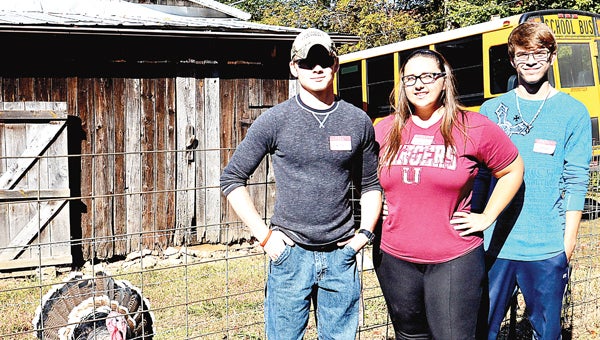Drop Collaborative program recognized by the state
Published 10:35 am Thursday, February 4, 2016

Star Photo/Rebekah Price
Supervised Agricultural Experience students Jacob Graybeal, Savannah Wood and Israel Harrah maintain the farm and livestock at the Drop Collaborative, which involves bottle-feeding a calf 2-3 times daily among other work.
After watching a video that detailed the success of the first year of Unaka High School’s Drop Collaborative, Tennessee Department of Education officials have recognized the program and requested to use it as a best practice model for Career and Technical Education (CTE) programs across the state.
Sharon Necessary, CTE consultant in the First Tennessee CORE Office plans to share the video with CTE directors in this month’s meeting in Nashville to highlight the multi-level functionality of the program.
“It’s not often that we see programs of this type,” said Necessary. “This is an excellent way for students to participate in community service and outreach while combining life skills like compassion and mentorship. The district can learn from the community engagement and active education.”
The Drop Collaborative is an off-campus Supervised Agricultural Experience (SAE) that forges the practical skills of agriculture with community outreach and mentorship.
All food produced on the farm is donated to help feed those in need. The Collaborative first donated food to Second Harvest Food Bank but then developed a partnership with Carter Christian Church, which operates a food bank in the Stoney Creek community, thus keeping the food raise on the farm within the community. Students in the program have also volunteered to help hand out food at the church on distribution days.
Heather Justice, executive director of the state CTE office highly praised the program for this community outreach element.
Being off-campus allows for an unprecedented and unique student experience, according to Unaka’s CTE Principal Melissa Loveless.
“You can bring the students to school and sit them in a classroom and tell them all day long how to do something, but when they get hands-on experience using what they learn in the classroom, that’s where you know if they are learning, and that’s what this is: taking classroom knowledge and information from the FFA experience and being able to apply that in a real world setting,” Loveless said.
Students are also learning transferable skills that they can take with them, she said. Whether they pursue agricultural careers or not, Loveless said the students learn the importance of being on time, responsibility, teamwork and cooperation.
“Those are things you can take into any field, and they’ve also learned how to be dependable,” she said.
The SAE students’ instructor Joshua Armentrout added to this list the importance of hard work and how much of it goes into food production.
“These students now know that food does not just come from the grocery store,” said Armentrout. “It has a beginning somewhere outside of that, and it also takes a lot of hard work and dedication from someone to get that end product of what we see on the shelf at the store.”
Aside from instilling these values, the experience also provides students with experience in the job application process and opportunities to mentor children.
Three students were selected and able to make the commitment from of a pool of applicants: Savannah Wood, Jacob Graybeal and Israel Harrah. They were required to prepare resumes, submit three letters of recommendation, interview for the position, keep a weekly journal and organize all work in a portfolio.
“One of the major goals of CTE is prepare students for careers, and I definitely think we are doing this at Unaka High School,” said Armentrout.
The program is not just an after-school activity. Just like any farm, the demands of the farm may be untimely and difficult. When they got a calf, students had to bottle feed it two to three times daily, before and after school, on top of other school work and duties on the farm as well as their other commitments outside of school.
The mentorship was achieved by planning a day for the pre-kindergarten and Head Start students from three local elementary schools to spend a day on the farm with Future Farmers of America students, SAE students and parents.
The land is provided to the program by the heir to the property, Pattie Meyer, Drop Collaborative’s executive director and co-founder, who with Ashlee Bevensee, executive advisor and co-founder, developed the idea for the Collaborative based on the dream of Meyer’s uncle and the original landowner, John Drop. Meyer contacted East Tennessee State University, and spoke with Ron Roach, chair of the Department of Appalachian Studies, who wanted to help. He connected them with Emily Bidgood of the Appalachian RC&D Council, and she suggested Unaka High School. From there, Armentrout, Loveless, Principal Betsy Oliver and CTE Director Mickey Taylor quickly assembled a strategy to develop the Collaborative.




